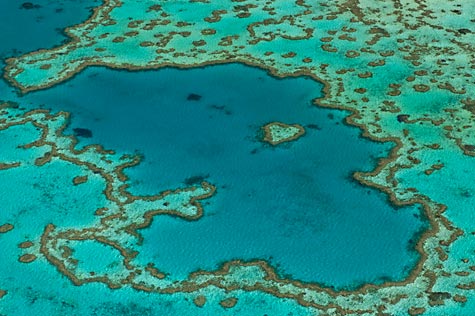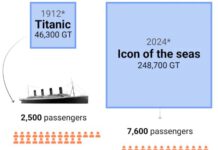Geneva, Switzerland – Reckless industrialization alongside the Great Barrier Reef could cause severe damage to one of Earth’s most important environmental systems, according to a new report commissioned by WWF. The Great Barrier Reef Under Threat found that the dumping of waste from port expansions within its World Heritage-listed boundaries would have “devastating impacts” on the reef.

In order to prevent unacceptable new stress on this already-vulnerable ecosystem, WWF is calling on the Australian government to ban all dumping of dredge spoil in the Great Barrier Reef World Heritage Site.
“The Great Barrier Reef is one of the planet’s richest ocean habitats, home to endangered species, a valuable economic asset for Australia, and a natural treasure for the whole world. Turning the reef into a dumping ground is the wrong choice for the environment and makes no business sense, particularly to build ports that are unnecessary,” said WWF International Director General Marco Lambertini.
Port expansion plans call for the dredging of approximately 51 million cubic metres of the ocean floor, enough seabed to fill up New York City’s Empire State Building 49 times. Much of that waste could be dumped in the Great Barrier Reef’s sensitive World Heritage waters, where it can cause damaging plumes of sediment that can drift for up to 80 kilometres. Dredging and dumping can smother corals and threaten the survival of endangered species like marine turtles.
Australia is seeking to more than double coal export capacity in the state of Queensland, even though the state’s existing coal port capacity sits unused one-third of the time, the analysis by independent consulting firm Dalberg Global Development Advisors found. Under current plans, Queensland’s coal export capacity would increase to 637 million tonnes annually, when near-term forecasts predict that Australia as a whole will export significantly less than that.
The coal industry globally appears to be in structural decline as renewable energy gains ground, the report says. “As a result, it is unlikely that all of the proposed coal ports will be needed. The damage to the reef, however, will have been made,” it says.
“To protect the reef and to safeguard the 69,000 jobs it provides, the Australian government needs to legislate a ban on the dumping of dredge spoil in the entire Great Barrier Reef World Heritage Site,” said Dermot O’Gorman, CEO of WWF-Australia. “In addition, dredging should be minimized and greater efforts made to improve water quality.”
“Great” Canadian natural icons threatened
Some of Canada’s most iconic ocean environments and species are also facing challenges on par with the Great Barrier Reef.
In early February, TransCanada said that its proposed oil terminal in Cacouna, Quebec – an important part of the Energy East pipeline project – remains a possibility in spite of its controversial location in well-known calving grounds for endangered St. Lawrence River belugas.
Meanwhile, on Canada’s west coast, plans for Enbridge’s Northern Gateway pipeline are going ahead in spite of the opposition of tens of thousands of Canadians. The pipeline will cut across the pristine Great Bear rainforest, and bring up to 220 oil tankers a year into this globally significant ecosystem. In an area that’s already a source of close to 10,000 long-term coastal jobs, the very real threat of an oil spill in Great Bear Sea would wipe out any financial gains from the pipeline and devastate livelihoods for generations to come – not to mention the area’s many species at risk.
“Cacouna and the Great Bear Sea, just like the Great Barrier Reef, are simply not places this kind of industrial expansion should take place,” said David Miller, President and CEO of WWF-Canada. “Turning these iconic areas into superhighways is a poor decision that puts far too much of our global natural heritage at-risk.”
World heritage in danger
If appropriate steps are not taken to reverse the Great Barrier Reef’s decline, the area risks being listed as “in danger” by UNESCO.
The status of port expansions and the Great Barrier Reef’s overall health could stir controversy at the June meeting of the World Heritage Committee in Bonn, Germany.
According to the WWF report, many prominent banks have backed away from financing coal terminals in the reef due to concerns over environmental impacts. WWF urges companies not to invest or participate in any project that could threaten the Great Barrier Reef or any other World Heritage Site.
“As we can see from the Great Barrier Reef, healthy ocean habitats can be engines for sensible economic growth that provide jobs and improve people’s wellbeing,” Lambertini said. “Responsible management of the ocean, which is essential to preserve the crucial role marine ecosystems play in providing food and jobs for billions, should be a key feature of any roadmap for a sustainable future.”
www.wwf.ca
[CA/ CH] 09 February 2015 – WWF-Canada











